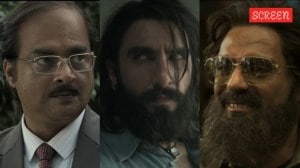Stay updated with the latest - Click here to follow us on Instagram
In Dads Footsteps
Strains of raga Ramkali can be heard across the road from the residence of Pandit Rajan and Sajan Mishra in West Delhi,where Rajans sons Ritesh and Rajneesh are engrossed in their daily riyaaz.
A new generation of classical Indian singers attempts to keep the family tradition alive
Strains of raga Ramkali can be heard across the road from the residence of Pandit Rajan and Sajan Mishra in West Delhi,where Rajans sons Ritesh and Rajneesh are engrossed in their daily riyaaz. Similarly,in Mumbais Borivli,Sabir Khans fingers are marked a peculiar shade of blue,from playing the Rajasthani maand on the sarangi under the strict supervision of his father Sultan Khan. Some 150 km from Mumbai,Srinivas Joshi,an IIT alumnus,does his kharaj ka riyaaz in Pune in between taking care of his father Pandit Bhimsen Joshi.
This is the new generation of classical musicians with famous parents,who might not be as talked about as their contemporaries Anoushka Shankar,Rahul Sharma or Amaan Ali Khan,yet have chosen classical music as their career and are quietly taking it forward. These are difficult times for Hindustani musicians faced with waning interest from a generation that relates more to Bollywood music,Buddha Bar and techno.
Weve grown up in a musical atmosphere that the choice came to us naturally, says Ritesh,34,the elder son of Rajan,the sixth generation in the family to be trained in the Banaras gharana. He tried modelling in college but is now devoted to pursuing a career in classical music. Rajneesh,who is two years younger,adds,People assume that since we are part of a popular musicians family,we will be given better taalim,or taught special compositions. But our struggles are our own.
Srinivas Joshi,son of the legendary Bhimsen Joshi,studied at IIT-Delhi and could have had a successful career as an engineer,but he decided music was his true calling at 25. All along,I planned to work as an engineer,but it didnt feel right. Besides,I had the opportunity to learn music from a great maestro, says Srinivas,38,who gave his first solo performance at 30 and is yet to create his own strong identity in music. I got initial attention because I am my fathers son,but eventually Ill only be successful if Im talented, says Srinivas,who seems unfazed by the inevitable comparisons.
The new generation understands that classical Indian music has to evolve to survive and remain relevant. Sabir,26,composes on the sarangi and has collaborated with several pop singers. He says,The sarangi has very few takers. This way at least Im keeping the tradition alive.







